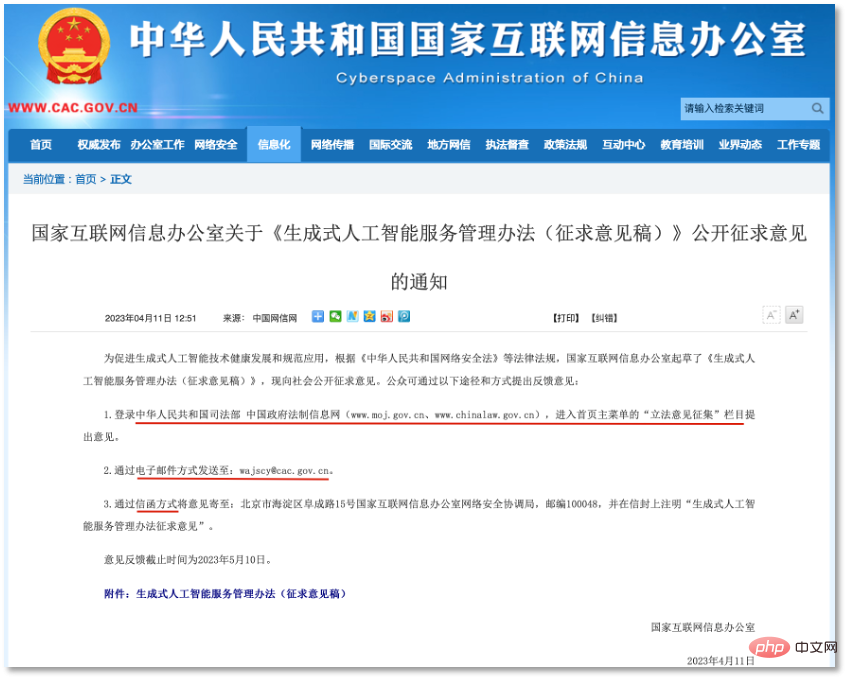 Technology peripherals
Technology peripherals
 AI
AI
 With full coverage of values and privacy protection, the Cyberspace Administration of China plans to 'establish rules” for generative AI
With full coverage of values and privacy protection, the Cyberspace Administration of China plans to 'establish rules” for generative AI
With full coverage of values and privacy protection, the Cyberspace Administration of China plans to 'establish rules” for generative AI
On April 11, the Cyberspace Administration of China (hereinafter referred to as the Cyberspace Administration of China) drafted and released the "Measures for the Management of Generative Artificial Intelligence Services (Draft for Comments)" and launched a month-long solicitation of opinions from the public. .

This management method (draft for comments) has a total of 21 articles. From the scope of application, it includes both the entities that provide generative artificial intelligence services and the users of these services. organizations and individuals; the management measures cover the value orientation of generative artificial intelligence output content, training principles for service providers, protection of privacy/intellectual property rights and other rights, etc.
The emergence of GPT-type generative natural language large models and products has not only allowed the public to experience the leaps and bounds of artificial intelligence, but also exposed security risks, including the generation of biased and discriminatory content, data leaks, Issues such as privacy invasion and AI fraud. Globally, the regulation of artificial intelligence in various countries has gradually become a trend.
In China, once the "Generative Artificial Intelligence Service Management Measures" are promulgated, the large models and product providers of domestic generative AI can no longer be "rolled" in disorder, and adopters will also have problems when using generative AI. the normative circle.
1. Set up "restricted areas" for generated content
"These Measures shall apply to those who develop and utilize generative artificial intelligence products to provide services to the public within the territory of the People's Republic of China.
The term “generative artificial intelligence” as mentioned in these Measures refers to the technology that generates text, pictures, sounds, videos, codes and other content based on algorithms, models, and rules.”
On April 11, the Cyberspace Administration of China released The "Measures for the Administration of Generative Artificial Intelligence Services (Draft for Comments)" (hereinafter referred to as the "Measures") clarifies the applicable subjects of the "Measures" and the definition of "generative artificial intelligence" in the second article.
Judging from the content of this article, companies such as Baidu, Alibaba, Tencent, and Huawei that have publicly stated that they have generative large models and products will be governed by the "Measures" if they provide services to users in China. Within the scope, users also need to comply with the provisions of the Measures when using relevant products and services.
The "Measures" also emphasize that the state supports independent innovation, promotion and application, and international cooperation of basic technologies such as artificial intelligence algorithms and frameworks, and encourages the priority use of safe and trustworthy software, tools, computing and data resources.
Under this premise, the "Measures" delineates "restricted areas" for providers of generative artificial intelligence products or services, including generated content and basic principles of research and development.
In terms of content, the "Measures" require: Content generated using generative artificial intelligence should reflect the core socialist values, and must not contain content that subverts state power, overthrows the socialist system, incites to split the country, undermines national unity, or promotes Terrorism, extremism, promotion of ethnic hatred, ethnic discrimination, violence, obscene pornographic information, false information, and content that may disrupt economic and social order; content generated using generative artificial intelligence should be true and accurate, and measures should be taken to prevent the generation of false information information.
In terms of research and development, the "Measures" require providers to take measures to prevent the occurrence of racial, ethnic, religious, national, regional, Discrimination based on gender, age, occupation, etc.
Judging from these requirements, the "Measures" basically cover the safety and ethical issues exposed by users of large-scale natural language model products on the market, including the generation of discriminatory bias, false information, etc.
Questionable content produced by humans through generative AI has appeared endlessly on the Internet.
For example, ChatGPT once provided steps for users to inquire about "how to shoplift", even though it included "tips on illegal shoplifting"; its "role-playing" function was once induced by users to DAN (Do Anyting Now) answered questions with the identity of "Do Anyting Now", and the answers given included "expletives"; some people also used ChatGPT to test fake news spread in the country, which became the content of "refuting rumors".
Microsoft's chatbot integrated into the search engine Bing was exposed by overseas media as "abusive to users"; the AI photo-generating application Midjourney was even used to create "The Pope wears a Balenciaga down jacket" and "Horse Some people even used it to create various non-existent earthquake histories, solar storm disasters, etc.

Fake pictures of the Pope (left) and Musk
Regarding false information and identifying AI-generated content, the "Measures" require providers to start from the source "Able to ensure the authenticity, accuracy, objectivity and diversity of data"; generative pictures, videos and other content should be labeled in accordance with the "Internet Information Services Deep Synthesis Management Regulations"; while generative artificial intelligence products are being developed When manual annotation is used, the provider shall formulate clear, specific, and operable annotation rules that comply with the requirements of these Measures, conduct necessary training for annotators, and verify the correctness of the annotated content on a sample basis.
Chinese regulation has set up restricted areas for generative artificial intelligence content. To some extent, it also requires companies that provide large models and products to control pre-training and data.
2. Emphasis on data sources and personal information protection
In addition to emphasizing value orientation, social ethics, compliance with laws and anti-discrimination for generated content, the "Measures" also emphasizes on generative artificial intelligence-related Requirements for pre-training and data sources, personal information protection and other rights and interests.
For example, the "Measures" require that providers should be responsible for the legality of the sources of pre-training data and optimization training data for generative artificial intelligence products, and do not contain content that infringes on intellectual property rights; if the data contains personal information, The consent of the personal information subject shall be obtained; the obligation to protect user input information and usage records shall not be illegally retained; input information that can be used to determine the user's identity shall not be illegally retained; user input information shall not be profiled based on user input information and usage; user input information shall not be provided to others.
The problem of data infringement caused by generative AI does exist. For example, when users use conversational robots to meet some work needs, they will inevitably upload company information. If they are not careful, it is likely to cause the leakage of business secrets. . Previously, South Korean electronics giant Samsung stated that internal data was leaked due to employees' interactions with the application after it filed a "restriction order" on ChatGPT.
The "Measures" not only point to providers of generative artificial intelligence products and services, but also stipulate principles for users of products and services.
For example, do not use generated content to damage the image, reputation and other legitimate rights and interests of others, and do not engage in commercial hype or unfair marketing.
Since the "Measures" were formulated in accordance with the higher-level laws "Cybersecurity Law of the People's Republic of China", "Data Security Law of the People's Republic of China", "Personal Information Protection Law of the People's Republic of China" and other laws and administrative regulations, these laws and regulations will Applicable to violations of the Measures, including infringement of intellectual property rights, infringement of personal information and other illegal activities.
The "Measures" have a total of 21 articles, 13 of which explicitly target "providers", that is, organizations and individuals who use generative artificial intelligence products to provide services such as chat and text, image, and sound generation.

The public can provide feedback through three channels
It can be seen that once the "Measures" are officially promulgated, domestic companies that make large generative models and products will Adopting parties will be required to act within the rules. According to the official website of the Cyberspace Administration of China, the public can provide feedback through three channels, and the deadline for feedback is May 10, 2023.
The above is the detailed content of With full coverage of values and privacy protection, the Cyberspace Administration of China plans to 'establish rules” for generative AI. For more information, please follow other related articles on the PHP Chinese website!

Hot AI Tools

Undresser.AI Undress
AI-powered app for creating realistic nude photos

AI Clothes Remover
Online AI tool for removing clothes from photos.

Undress AI Tool
Undress images for free

Clothoff.io
AI clothes remover

Video Face Swap
Swap faces in any video effortlessly with our completely free AI face swap tool!

Hot Article

Hot Tools

Notepad++7.3.1
Easy-to-use and free code editor

SublimeText3 Chinese version
Chinese version, very easy to use

Zend Studio 13.0.1
Powerful PHP integrated development environment

Dreamweaver CS6
Visual web development tools

SublimeText3 Mac version
God-level code editing software (SublimeText3)

Hot Topics
 1653
1653
 14
14
 1413
1413
 52
52
 1304
1304
 25
25
 1251
1251
 29
29
 1224
1224
 24
24
 Bytedance Cutting launches SVIP super membership: 499 yuan for continuous annual subscription, providing a variety of AI functions
Jun 28, 2024 am 03:51 AM
Bytedance Cutting launches SVIP super membership: 499 yuan for continuous annual subscription, providing a variety of AI functions
Jun 28, 2024 am 03:51 AM
This site reported on June 27 that Jianying is a video editing software developed by FaceMeng Technology, a subsidiary of ByteDance. It relies on the Douyin platform and basically produces short video content for users of the platform. It is compatible with iOS, Android, and Windows. , MacOS and other operating systems. Jianying officially announced the upgrade of its membership system and launched a new SVIP, which includes a variety of AI black technologies, such as intelligent translation, intelligent highlighting, intelligent packaging, digital human synthesis, etc. In terms of price, the monthly fee for clipping SVIP is 79 yuan, the annual fee is 599 yuan (note on this site: equivalent to 49.9 yuan per month), the continuous monthly subscription is 59 yuan per month, and the continuous annual subscription is 499 yuan per year (equivalent to 41.6 yuan per month) . In addition, the cut official also stated that in order to improve the user experience, those who have subscribed to the original VIP
 Context-augmented AI coding assistant using Rag and Sem-Rag
Jun 10, 2024 am 11:08 AM
Context-augmented AI coding assistant using Rag and Sem-Rag
Jun 10, 2024 am 11:08 AM
Improve developer productivity, efficiency, and accuracy by incorporating retrieval-enhanced generation and semantic memory into AI coding assistants. Translated from EnhancingAICodingAssistantswithContextUsingRAGandSEM-RAG, author JanakiramMSV. While basic AI programming assistants are naturally helpful, they often fail to provide the most relevant and correct code suggestions because they rely on a general understanding of the software language and the most common patterns of writing software. The code generated by these coding assistants is suitable for solving the problems they are responsible for solving, but often does not conform to the coding standards, conventions and styles of the individual teams. This often results in suggestions that need to be modified or refined in order for the code to be accepted into the application
 Seven Cool GenAI & LLM Technical Interview Questions
Jun 07, 2024 am 10:06 AM
Seven Cool GenAI & LLM Technical Interview Questions
Jun 07, 2024 am 10:06 AM
To learn more about AIGC, please visit: 51CTOAI.x Community https://www.51cto.com/aigc/Translator|Jingyan Reviewer|Chonglou is different from the traditional question bank that can be seen everywhere on the Internet. These questions It requires thinking outside the box. Large Language Models (LLMs) are increasingly important in the fields of data science, generative artificial intelligence (GenAI), and artificial intelligence. These complex algorithms enhance human skills and drive efficiency and innovation in many industries, becoming the key for companies to remain competitive. LLM has a wide range of applications. It can be used in fields such as natural language processing, text generation, speech recognition and recommendation systems. By learning from large amounts of data, LLM is able to generate text
 Can fine-tuning really allow LLM to learn new things: introducing new knowledge may make the model produce more hallucinations
Jun 11, 2024 pm 03:57 PM
Can fine-tuning really allow LLM to learn new things: introducing new knowledge may make the model produce more hallucinations
Jun 11, 2024 pm 03:57 PM
Large Language Models (LLMs) are trained on huge text databases, where they acquire large amounts of real-world knowledge. This knowledge is embedded into their parameters and can then be used when needed. The knowledge of these models is "reified" at the end of training. At the end of pre-training, the model actually stops learning. Align or fine-tune the model to learn how to leverage this knowledge and respond more naturally to user questions. But sometimes model knowledge is not enough, and although the model can access external content through RAG, it is considered beneficial to adapt the model to new domains through fine-tuning. This fine-tuning is performed using input from human annotators or other LLM creations, where the model encounters additional real-world knowledge and integrates it
 Five schools of machine learning you don't know about
Jun 05, 2024 pm 08:51 PM
Five schools of machine learning you don't know about
Jun 05, 2024 pm 08:51 PM
Machine learning is an important branch of artificial intelligence that gives computers the ability to learn from data and improve their capabilities without being explicitly programmed. Machine learning has a wide range of applications in various fields, from image recognition and natural language processing to recommendation systems and fraud detection, and it is changing the way we live. There are many different methods and theories in the field of machine learning, among which the five most influential methods are called the "Five Schools of Machine Learning". The five major schools are the symbolic school, the connectionist school, the evolutionary school, the Bayesian school and the analogy school. 1. Symbolism, also known as symbolism, emphasizes the use of symbols for logical reasoning and expression of knowledge. This school of thought believes that learning is a process of reverse deduction, through existing
 To provide a new scientific and complex question answering benchmark and evaluation system for large models, UNSW, Argonne, University of Chicago and other institutions jointly launched the SciQAG framework
Jul 25, 2024 am 06:42 AM
To provide a new scientific and complex question answering benchmark and evaluation system for large models, UNSW, Argonne, University of Chicago and other institutions jointly launched the SciQAG framework
Jul 25, 2024 am 06:42 AM
Editor |ScienceAI Question Answering (QA) data set plays a vital role in promoting natural language processing (NLP) research. High-quality QA data sets can not only be used to fine-tune models, but also effectively evaluate the capabilities of large language models (LLM), especially the ability to understand and reason about scientific knowledge. Although there are currently many scientific QA data sets covering medicine, chemistry, biology and other fields, these data sets still have some shortcomings. First, the data form is relatively simple, most of which are multiple-choice questions. They are easy to evaluate, but limit the model's answer selection range and cannot fully test the model's ability to answer scientific questions. In contrast, open-ended Q&A
 SOTA performance, Xiamen multi-modal protein-ligand affinity prediction AI method, combines molecular surface information for the first time
Jul 17, 2024 pm 06:37 PM
SOTA performance, Xiamen multi-modal protein-ligand affinity prediction AI method, combines molecular surface information for the first time
Jul 17, 2024 pm 06:37 PM
Editor | KX In the field of drug research and development, accurately and effectively predicting the binding affinity of proteins and ligands is crucial for drug screening and optimization. However, current studies do not take into account the important role of molecular surface information in protein-ligand interactions. Based on this, researchers from Xiamen University proposed a novel multi-modal feature extraction (MFE) framework, which for the first time combines information on protein surface, 3D structure and sequence, and uses a cross-attention mechanism to compare different modalities. feature alignment. Experimental results demonstrate that this method achieves state-of-the-art performance in predicting protein-ligand binding affinities. Furthermore, ablation studies demonstrate the effectiveness and necessity of protein surface information and multimodal feature alignment within this framework. Related research begins with "S
 SK Hynix will display new AI-related products on August 6: 12-layer HBM3E, 321-high NAND, etc.
Aug 01, 2024 pm 09:40 PM
SK Hynix will display new AI-related products on August 6: 12-layer HBM3E, 321-high NAND, etc.
Aug 01, 2024 pm 09:40 PM
According to news from this site on August 1, SK Hynix released a blog post today (August 1), announcing that it will attend the Global Semiconductor Memory Summit FMS2024 to be held in Santa Clara, California, USA from August 6 to 8, showcasing many new technologies. generation product. Introduction to the Future Memory and Storage Summit (FutureMemoryandStorage), formerly the Flash Memory Summit (FlashMemorySummit) mainly for NAND suppliers, in the context of increasing attention to artificial intelligence technology, this year was renamed the Future Memory and Storage Summit (FutureMemoryandStorage) to invite DRAM and storage vendors and many more players. New product SK hynix launched last year



